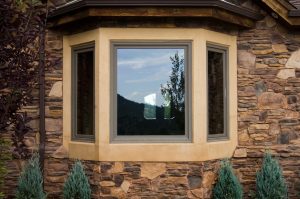
Home window replacement is a big decision, and when it comes to replacing the windows in your own home, there are many questions to ask and factors to consider. Depending on your home’s design and the conditions of your existing windows, some of your needs may be more pressing than others. But regardless of whether you’re torn between Fibrex® and vinyl, make sure you consider the cons of buying vinyl windows before purchasing them for your home.
1. Vinyl windows typically don’t reduce energy bills.
Because vinyl windows expand and contract with temperature fluctuation, the seal between the vinyl framework and the glass begins to fail whenever the weather goes from good to bad. This problem only increases with the size of your home’s window—so the bigger the window sash, the sooner the window will begin to lose its functionality. And considering that vinyl windows cannot be repaired, just replaced, temperature changes that cause contraction and expansion also increase the amount of outside air filtering into your home. Ultimately, this will require the daily use of your AC in the summer and heater in the winter to make up the difference before they’re replaced.
2. Vinyl windows don’t maintain functionality.
While all windows expand and contract when temperatures soar or drop, in these conditions, vinyl actually expands at more than two times the rate of our Fibrex® material. Their seals will eventually fail, the desiccant will dissolve and the windows will develop permanent condensation. So while the window may last the length of its warranty, its functionality will last for a lot less time. On the other hand, Fibrex® windows won’t corrode, warp, rot, crack, bow or shrink in inclement weather conditions as vinyl is known to do, meaning our reclaimed wood composite material will outlast any vinyl window.
3. Vinyl windows lower the value of classic and historic homes.
If you live in a historic neighborhood that prides itself in retaining its original charm, the value of the house on the block with vinyl windows is going to decrease dramatically—one of the many cons of buying vinyl windows. Because people pay for integrity in classic neighborhoods, high quality, aesthetically pleasing and weatherproof windows are integral to the architectural features of the home. Because Renewal by Andersen’s window products are rooted in craftsmanship, the types of customized design details we provide simply can’t be matched by vinyl.
4. Vinyl windows are toxic to the environment.
Pro: Fibrex® windows are responsibly made, sustainable to your home and Green Seal Certified. Con: Vinyl windows are made through a toxic petroleum manufacturing process and are harmful to the environment once they are discarded. Manufacturing vinyl requires polyvinyl chloride (PVC), which forms the toxic carcinogen dioxin when PVC is manufactured and burned. Renewal by Andersen windows have achieved the highest SCS Global Services-certified recycled content values for windows. Our Fibrex® products contain 40% reclaimed wood fiber by weight thanks to Andersen Corporation’s wood-window manufacturing process. In addition, installing our ENERGY STAR® certified windows and doors can shrink energy bills—and carbon footprints—by an average of 12% nationwide compared to non-certified products. So, when comparing window replacement options, don’t forget: Always compare whole window performance and not just the individual window components.
5. Vinyl windows are not fire resistant.
Arguably the biggest con of buying vinyl windows is that they melt easily and release toxic fumes that are hazardous to the health of your loved ones, especially children, as well your home. In addition, firefighting has become a problem when battling a house fire that involves vinyl windows. When it comes to survival, the difficulty in opening or removing vinyl windows can be life threatening if you need to immediately evacuate, not to mention that because vinyl windows easily melt, the glass panes they encase are quick to fall out, allowing a passing fire to easily enter.
Cons of buying vinyl windows, in conclusion
While there are many issues to consider when choosing new windows for your home, quality and safety should not be sacrificed for price. After reviewing the cons of buying vinyl windows—and considering the lifespan of our Fibrex® windows and doors paired with our comprehensive warranty and window financing options—choosing the right type of window for you might be easier than you think. Schedule a free window consultation today to talk to an expert team member about how we can best serve your replacement window needs.






